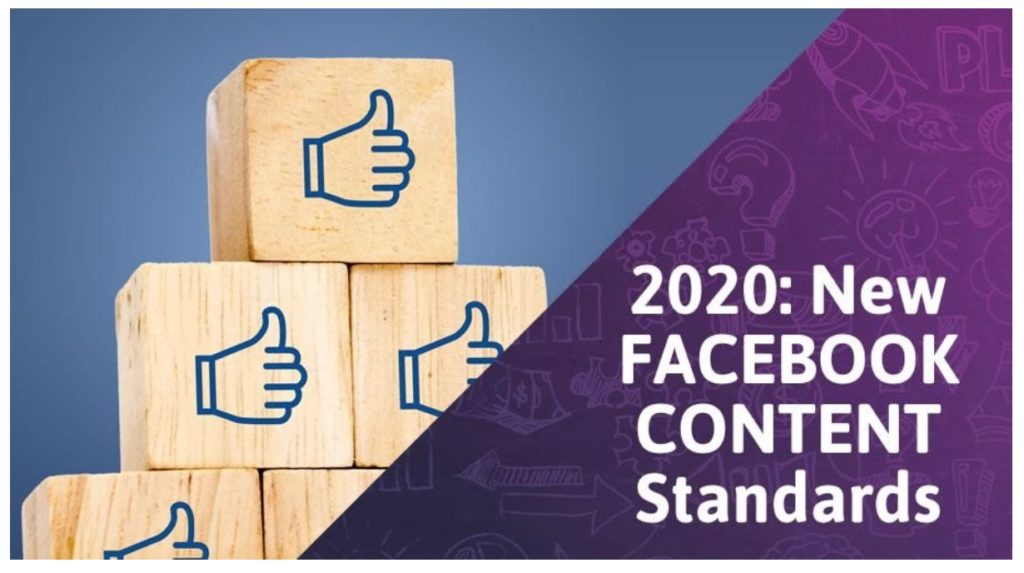Business
How will changes to Facebook’s terms of service affect your business?
Social media continues to evolve and change with some of these changes possibly affecting small business. Facebook has just announced an update to their Terms of Service, effective October 1st, 2020. So, what will this mean to you and your small business? Here are a couple of suggestions to ensure you’re prepared for whatever the new Facebook content standards bring.

To say that 2020 has been a year of changes would be an understatement! While we never know what the future will bring, one thing I can say for certain is that social media will continue to change and evolve.
And it seems like not a week goes by that there isn’t a social media update! It’s enough to frustrate even the seasoned marketer.

One of the new Facebook guidelines in 2020 was FB5, otherwise known as the “New Facebook”
I’m sure you’ve noticed this change, which has altered the look and feel of the platform on desktop and mobile. Facebook claims this new design will make the user experience simpler and faster and put a focus on communities.
From what I’m reading in my feed, so far that hasn’t been the case! But like any changes, we often need time to get used to the new layout of the land before we can embrace the benefits of the change.
What has been your experience so far with the new layout? Love it or hate it? Let me know below!
TOC update effective October 1, 2020
And another important change is coming up: Facebook has just announced an update to their Terms of Service, effective October 1st. Many users this week saw the following pop-up message:
“Effective October 1, 2020, section 3.2 of our Terms of Service will be updated to include: ‘We also can remove or restrict access to your content, services or information if we determine that doing so is reasonably necessary to avoid or mitigate adverse legal or regulatory impacts to Facebook.’”
You may be reading this and thinking…so what? They update their Terms of Service all the time.
But these new Facebook content standards are getting attention for a few reasons, one being that the social media giant usually doesn’t tell us about updates—there are just way too many, and most are pretty minor.
Here are a couple of theories I’ve seen as to why this message is being shared:
- They plan to remove or censor content in advance of the U.S. election. They’ve been accused in the past of censoring certain political messages.
- The social media platform recently threatened to block Australian publishers and individuals from sharing news stories, after lawmakers proposed a rule that could require the social media platform to compensate media organizations for use of their stories. That could cost them a lot of money, so they want to be ready.
- This new rule is an editorial policy to reflect their attempt to become a ‘real’ media company, not just a social media platform. Before news becomes a core focus of the site, they’re putting editorial guidelines into place.
Whatever the reasoning, these changes to the Terms of Service are facing a lot of scrutiny from users all around the world.
It will be very interesting to see what the new Facebook content standards mean for businesses of all sizes around the world.
What does the update mean for small business owners?
Of course, we won’t know for sure what impact these new Facebook guidelines in 2020 will have yet. But I have a couple of suggestions to ensure you’re prepared for whatever the new Facebook content standards bring:
- As small business owners, we rely a lot on social media for our leads, whether that’s selling on a social media marketplace or through a business page.
- But there’s a danger in putting too much emphasis on social media for leads and neglecting other marketing tactics like paid advertising and email newsletters.
And of course, it’s crucial you keep your website optimized—both for the customer experience (e.g., site speed, appealing images) and for the search engines (e.g., targeting the right keywords in your copy, making sure all of your pages have relevant title tags).
- And speaking of website, I see many entrepreneurs rely solely on Facebook to generate sales for their business. This is a precarious way to run a business! No matter where you generate the most leads from, it’s imperative to have a website that serves as the foundational base for your business.
By relying on social media for your entire business operation puts you in an extreme risk of having it all be shut down due to inadvertently doing something against the terms of that platform.
If Facebook decided you were in violation, boom! Your profile, page and/or group could be shut down in an instant. - How will the new service terms affect advertising? This is a huge question. But if you put budget and effort into paid social media ads for your small business, make sure you have adequate exposure on other platforms such as Google Ads.
That way, you’re all set in case your social media-driven paid traffic suddenly declines or drops off completely.
- Pay close attention to what you’re posting. This is a good rule of thumb anyways. Double-check your social media posts to ensure you’re not sharing anything that could be deemed inappropriate or offensive.
I recommend avoiding political posts (or posts on any other topic you wouldn’t discuss at a dinner party). That way, you’ll always avoid being censored or penalized by sharing something that could be classified as offensive under these new Facebook content standards.
I’m not saying this change is going to drastically impact your small business. These changes to their terms of service may simply mean a decrease in fake news and offensive content.
But we have to be prepared, proactive and waiting for this—and the next update—to stay ahead of the competition and keep those leads coming in!
—
(Featured image by Tim Bennett via Unsplash)
DISCLAIMER: This article was written by a third party contributor and does not reflect the opinion of Born2Invest, its management, staff or its associates. Please review our disclaimer for more information.
This article may include forward-looking statements. These forward-looking statements generally are identified by the words “believe,” “project,” “estimate,” “become,” “plan,” “will,” and similar expressions. These forward-looking statements involve known and unknown risks as well as uncertainties, including those discussed in the following cautionary statements and elsewhere in this article and on this site. Although the Company may believe that its expectations are based on reasonable assumptions, the actual results that the Company may achieve may differ materially from any forward-looking statements, which reflect the opinions of the management of the Company only as of the date hereof. Additionally, please make sure to read these important disclosures.

-

 Africa2 weeks ago
Africa2 weeks agoMASI Surge Exposes Market Blind Spot: The SAMIR Freeze and Hidden Risks
-

 Cannabis2 days ago
Cannabis2 days agoSnoop Dogg Searches for the Lost “Orange” Cannabis Strain After Launching Treats to Eat
-

 Crypto1 week ago
Crypto1 week agoIntesa Sanpaolo Signals Institutional Shift With Major Bitcoin ETF Investments
-

 Markets4 days ago
Markets4 days agoRice Market Slips as Global Price Pressure and Production Concerns Grow


















